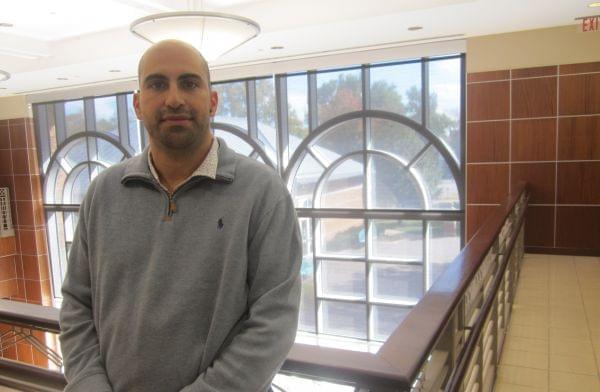Salaita To leave Academe To Write and Lecture

Steven Salaita, visiting professor at the American University of Beirut, during a visit to the University of Illinois in 2015. Jim Meadows/Illinois Public Media
Steven Salaita, whose job offer from the University of Illinois was rescinded after he posted controversial tweets about Israel, says he is leaving academia, because he is unable to find work in it.
Salaita has worked for the past two years as a visiting professor at the American University of Beirut. But he posted on his Facebook page this past Saturday he has been unable to find further academic work.
“A number of colleagues have attempted to recruit me,” writes Salaita, “but their efforts always get shut down by management.”
Stating that he refuses “to tolerate the indignities of a blacklist”, Salaita writes that his immediate plans are to write and lecture. “Whatever I end up doing, I will maintain the spirit of noncompliance that defined my time in academe,” he wrote. “If you take any lesson from my ouster, please don’t let it be fear or caution.”
Salaita’s announcement was reported Monday in The Chronicle of Higher Education, which noted that the University of Illinois had offered him a tenured position, “but the university’s administration later rescinded the offer after critical comments Mr. Salaita had made about Israel came to light and drew fire online.“
As Salaita faced accusations of anti-Semitism for his tweets, then-chancellor Phyllis Wise responded to the controversy by rescinding his appointment in 2014, with the Board of Trustees endorsing the move a few months later. Salaita sued the university, and eventually accepted a settlement payment from the U of I of more than $800,000, in exchange for agreeing never to seek employment at the university in the future.
For its actions in the Salaita case, the University of Illinois was censured in 2015 by the American Association of University Professors. The AAUP lifted its censure earlier this year.
Salaita wrote about the controversy in his 2015 book “Uncivil Rites: Palestine and the Limits of Academic Freedom.”
Links
- U of I - Salaita Agreement Finalized; Payment To Salaita Is Next
- Settling With Salaita - What It Means to Settle a Lawsuit
- Salaita’s Desire For His Job Back Never A Reality Under Negotiations
- Salaita’s Hope Of Teaching At U Of I Continues, One Year After Appointment Withdrawn
- AAUP Censures U Of I Over Salaita

